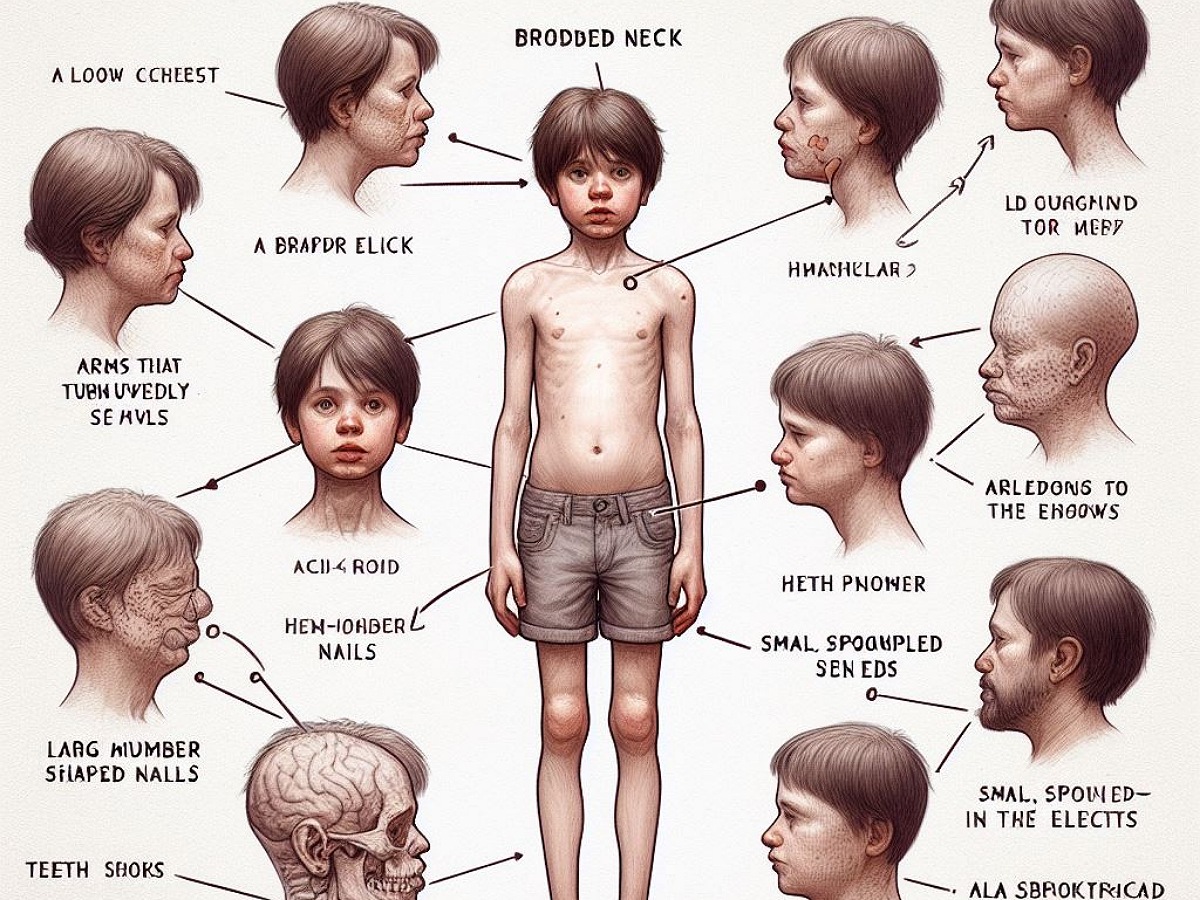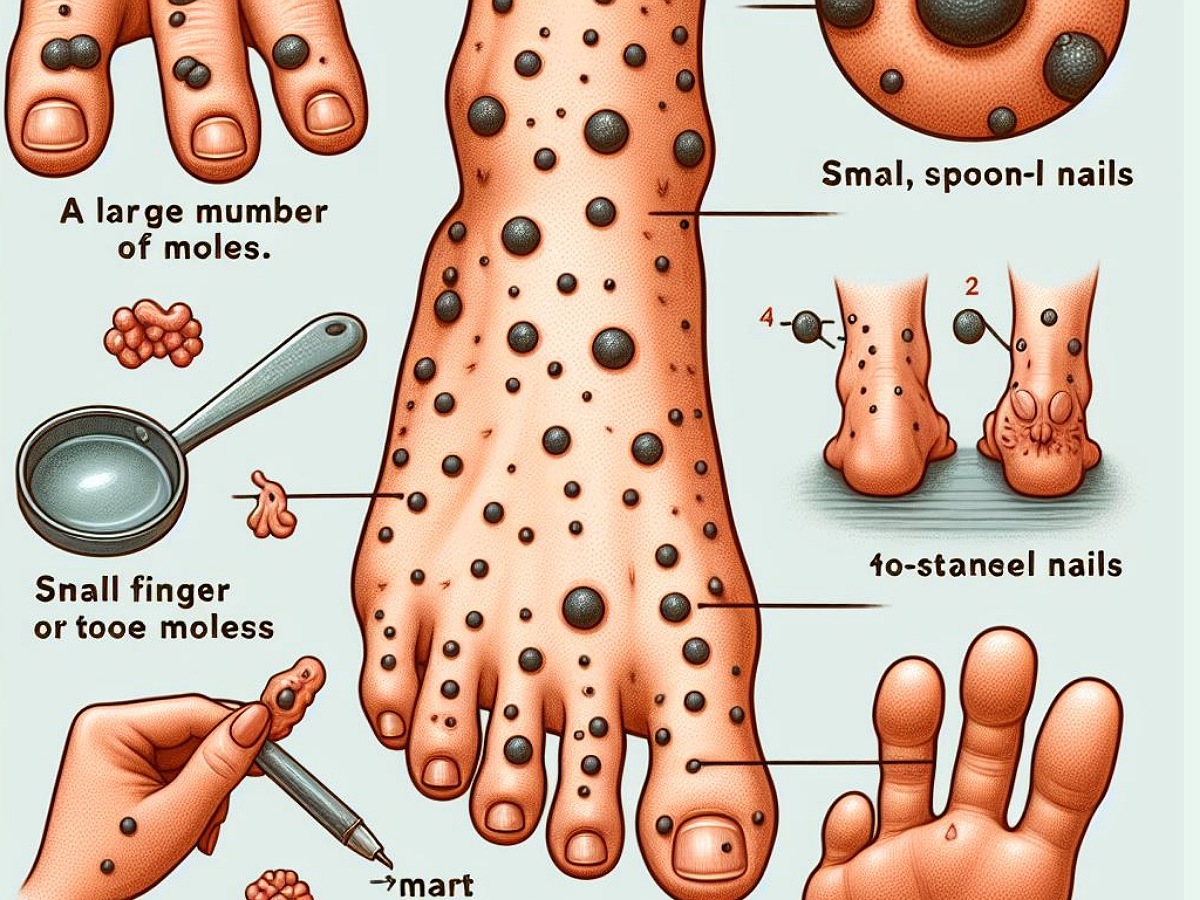Turner Syndrome Overview

Turner syndrome, a distinctive genetic condition, manifests as a chromosomal anomaly affecting females, where a partial or complete absence of one X chromosome disrupts normal development. This rare mental disorder, with an incidence of approximately 1 in 2,000 live female births, gives rise to a spectrum of physical and medical challenges. Unraveling the intricacies of Turner syndrome unveils a captivating narrative of genetic intricacy, emphasizing the significance of understanding its nuances for comprehensive medical insight. Join us in exploring Turner syndrome’s unique landscape, where genetics, physiology, and health converge in a captivating tapestry of scientific fascination.
Symptoms of Turner Syndrome
Turner syndrome, an intricate genetic anomaly, manifests an array of distinctive symptoms, shedding light on the complexities woven into the fabric of affected individuals’ lives. Unraveling these intricacies provides a deeper understanding of the condition and offers valuable insights for medical professionals and caregivers. Let’s delve into the nuanced world of Turner syndrome symptoms, exploring the rare and unique facets that define this genetic landscape.
Short Stature with a Unique Stature
Individuals with Turner syndrome often exhibit short stature, significantly below the average range. This unique aspect sets them apart, emphasizing the impact of genetic intricacies on growth patterns.
Webbed Neck Elegance
A remarkable feature associated with Turner syndrome is the presence of a webbed neck. This distinctive trait, a result of skin folds, contributes to the syndrome’s diagnostic profile, adding an element of rarity to the physical manifestations.
Cardiovascular Complexity
Turner syndrome is intricately linked to cardiovascular anomalies, encompassing a spectrum of conditions such as aortic coarctation and bicuspid aortic valve. This unique cardiovascular interplay underscores the importance of vigilant cardiac monitoring in individuals with Turner syndrome.
Ovarian Ovations

The absence or underdevelopment of ovaries, leading to infertility, marks another distinctive facet of Turner syndrome. Exploring the genetic underpinnings of reproductive challenges unveils the intricate tapestry of factors influencing fertility in affected individuals.
Ear Elegance
Low-set ears, another noteworthy symptom, contribute to the unique facial features of Turner syndrome. This subtle yet defining characteristic enhances the syndrome’s diagnostic landscape, emphasizing the importance of a keen clinical eye.
Strabismus Sophistication
Eyes do not align properly, which emerges as a distinctive ocular manifestation of Turner syndrome. This intricate interplay of genetic factors and eye health underscores the need for specialized ophthalmic care.
Lymphatic Labyrinth
Lymphedema, characterized by the accumulation of lymphatic fluid and subsequent swelling, represents a unique aspect of Turner syndrome. Understanding the intricacies of lymphatic dynamics in this context unveils a rare dimension of the syndrome’s clinical presentation.
Renal Reflections
Renal anomalies, including horseshoe kidneys or structural variations, contribute to the diverse symptomatology of Turner syndrome. Exploring the genetic influences on renal development adds a unique layer to our comprehension of the syndrome’s multi-systemic impact.
Metabolic Marvels
Turner syndrome may also influence metabolic processes, leading to an increased risk of conditions such as insulin resistance and type 2 diabetes. This metabolic dimension adds a unique layer to the syndrome’s spectrum, reinforcing the need for comprehensive health management.
Cognitive Contours

While intelligence is typically within the normal range, individuals with Turner syndrome may exhibit specific cognitive strengths and challenges. Understanding these cognitive contours sheds light on the nuanced interplay between genetics and cognitive development.
In navigating the diverse symptoms of Turner syndrome, it becomes evident that this genetic anomaly is not a monolithic entity but rather a mosaic of rare and unique features. This comprehensive exploration serves as a valuable resource for medical professionals and fosters awareness and empathy for individuals living with Turner syndrome. As we continue to unveil the intricacies of this genetic tapestry, the pursuit of knowledge becomes a powerful tool in promoting holistic care and understanding for those affected by Turner syndrome.
Causes of Turner Syndrome
Turner syndrome, a distinctive genetic anomaly, unfolds a complex narrative of causative factors that shape the genetic landscape of affected individuals. Delving into the rare and unique aspects of these causes enhances our understanding of this condition and provides valuable insights for medical practitioners and researchers. Let’s explore the intricacies of Turner syndrome, exploring the genetic tapestry that sets this condition apart.
Monosomy Magic
At the heart of Turner syndrome lies a chromosomal aberration known as monosomy, specifically monosomy X. Unlike the typical chromosomal pairing of XX in females, individuals with Turner syndrome possess only one X chromosome. This rare occurrence, often caused by errors in cell division during the formation of eggs or sperm, sets the stage for the unique genetic landscape associated with Turner syndrome.
Meiotic Mysteries
Turner syndrome predominantly results from errors during meiosis. Non-disjunction, a meiotic glitch where chromosomes fail to separate correctly, leads to the formation of eggs lacking an X chromosome or with two X chromosomes. When such an egg is fertilized, it results in the monosomy X characteristic of Turner syndrome.
Random Chromosomal Roulette
Turner syndrome is largely unpredictable and appears to be a random event. Unlike some genetic conditions with a familial predisposition, Turner syndrome typically arises sporadically. This randomness adds a unique layer of complexity to the causative factors, making it challenging to anticipate or prevent.
Maternal Age Anecdotes
While Turner syndrome can occur in pregnancies across various maternal age ranges, there is a noteworthy association with advanced maternal age. The likelihood of meiotic errors, including non-disjunction, increases with maternal age, contributing to the observed correlation between older maternal age and the incidence of Turner syndrome.
Genetic Gambit
Beyond meiotic errors, genetic mutations and deletions in the X chromosome can also give rise to Turner syndrome. These alterations may disrupt normal development and contribute to the diverse array of symptoms associated with the condition. The interplay of these genetic gambits adds an intriguing layer to the genetic origins of Turner syndrome.
Mysterious Mosaicism
In some instances, individuals with Turner syndrome exhibit a genetic phenomenon known as mosaicism. This means that not all cells in the body have the same chromosomal makeup. Mosaicism can result from errors during early embryonic development, leading to a mosaic pattern of X chromosome presence. This unique genetic mosaic contributes to the varied presentation of symptoms in affected individuals.
X Chromosome X-Factors
The X chromosome, a key player in Turner syndrome, harbors essential genes responsible for normal development. The loss or alteration of these genes due to monosomy or genetic mutations contributes significantly to the condition’s multifaceted nature. Exploring these X chromosome X factors unravels the intricate genetic web underlying Turner syndrome.
Environmental Enigma
While genetics predominantly underpin Turner syndrome, environmental factors may also play a role. However, the specific environmental triggers or influences remain elusive. Unraveling this environmental enigma presents a challenge, and researchers continue to investigate potential factors that may interact with genetic predispositions.
Immunological Intricacies
Emerging research suggests a potential link between Turner syndrome and immune system dynamics. Immunological factors may contribute to the condition’s variability and impact on different organ systems. Understanding these immunological intricacies adds a layer of complexity to the causal factors associated with Turner syndrome.
Technological Tales
Advances in genetic screening technologies have facilitated early detection of Turner syndrome during prenatal testing. The ability to identify chromosomal abnormalities before birth opens new chapters in understanding the causative factors and offers opportunities for early intervention and support.
In unraveling the causes of Turner syndrome, we encounter a rich tapestry of genetic anomalies, meiotic mysteries, and environmental enigmas. This intricate interplay of factors contributes to the uniqueness of Turner syndrome and highlights the need for ongoing research to deepen our understanding. As we navigate this genetic labyrinth, the quest for knowledge becomes a powerful ally in shaping compassionate care and advancing scientific insights into the complexities of Turner syndrome.
Impacts of Turner Syndrome
Turner syndrome, a captivating genetic anomaly, profoundly impacts individuals, shaping their physical, psychological, and social landscapes in distinctive ways. Exploring the rare and unique impacts of Turner syndrome enriches our comprehension of this condition and underscores the importance of holistic care and support. Join us on a journey through the intricate tapestry of Turner syndrome’s impacts, delving into the nuances that define the experiences of those living with this genetic variation.
Stature Struggle
One of the most visually striking impacts of Turner syndrome is the challenge of short stature. Individuals with Turner syndrome often face societal perceptions and stereotypes related to height, navigating a world that may not always accommodate their unique physical attributes. This impact extends beyond the physiological realm, influencing self-esteem and interpersonal dynamics.
Fertility Fables
The absence or underdevelopment of ovaries in individuals with Turner syndrome leads to infertility, presenting a complex emotional landscape. Fertility is a central aspect of human identity for many, and grappling with the inability to conceive naturally brings forth a range of emotions. Addressing the emotional and psychological impacts of fertility challenges is a crucial aspect of comprehensive care for individuals with Turner syndrome.
Cardiac Complexities
Turner syndrome frequently intertwines with cardiovascular anomalies, including aortic coarctation and bicuspid aortic valve. These cardiac complexities necessitate vigilant monitoring and, in some cases, surgical interventions. The impact on cardiovascular health underscores the importance of specialized medical care tailored to the unique needs of individuals with Turner syndrome.
Educational Expeditions
Cognitive abilities in individuals with Turner syndrome typically fall within the normal range, but specific learning strengths and challenges may exist. Navigating the educational landscape becomes an expedition requiring tailored support and understanding. Addressing these cognitive impacts ensures that individuals can unlock their full academic potential.
Social Stigma Shadows
The distinctive physical features of Turner syndrome, such as low-set ears, may subject individuals to social stigma and misconceptions. Cultivating awareness and fostering an inclusive society are essential in mitigating the impact of societal judgments and promoting a more understanding and accepting environment.
Lymphatic Labyrinth
Lymphedema, a potential consequence of Turner syndrome, introduces swelling and fluid retention challenges. Managing these lymphatic intricacies requires a multidisciplinary approach, addressing the physical and emotional aspects of living with this unique impact.
Ophthalmic Odyssey
Strabismus, an ocular manifestation of Turner syndrome, presents challenges in eye coordination. Navigating the visual landscape becomes an odyssey, requiring specialized ophthalmic care to optimize eye health and visual function.
Renal Reflections
Renal anomalies, including variations in kidney structure, contribute to the multifaceted impacts of Turner syndrome. Monitoring renal health becomes integral to overall well-being, emphasizing the need for comprehensive medical management tailored to individual needs.
Psychosocial Puzzles
The psychosocial impacts of Turner syndrome encompass a spectrum of experiences, from coping with body image concerns to navigating social relationships. Providing psychological support and fostering resilience are crucial components of addressing the psychosocial puzzles that individuals with Turner syndrome may encounter.
Lifelong Wellness
Turner syndrome necessitates a lifelong commitment to health management. Regular medical check-ups, hormonal interventions, and specialized care become integral components of a wellness journey that spans the lifespan. The impacts of Turner syndrome underscore the importance of a holistic approach to healthcare that considers not only the physical but also the emotional and social dimensions of well-being.
In understanding the impacts of Turner syndrome, we recognize the importance of a comprehensive and individualized approach to care. The rare and unique aspects of this genetic anomaly highlight the need for ongoing research, awareness, and advocacy to ensure that individuals with Turner syndrome can lead fulfilling lives. By unraveling the intricacies of these impacts, we contribute to a more empathetic and supportive society that celebrates the diversity of human experiences.
Diagnosis of Turner Syndrome
Diagnosing Turner syndrome involves a multifaceted approach, combining clinical evaluation, genetic testing, and specialized assessments to unravel the intricacies of this rare genetic condition. Exploring the unique and rare aspects of Turner syndrome diagnosis enhances medical understanding and serves as a valuable resource for individuals, families, and healthcare professionals. Join us on a comprehensive journey through the diagnostic landscape of Turner syndrome, where precision and sensitivity converge to unveil the genetic tapestry that defines this condition.
Clinical Clues
The diagnostic odyssey often commences with clinical observations. Certain physical features associated with Turner syndrome, such as short stature, a webbed neck, and low-set ears, may prompt healthcare professionals to consider the possibility of this genetic anomaly. These clinical clues serve as initial guideposts, sparking further investigations into the individual’s genetic makeup.
Growth Chart Galaxies
The assessment of growth patterns plays a pivotal role in Turner syndrome diagnosis. Deviations from the expected growth trajectory, particularly significant short stature, raise red flags for further evaluation. Growth charts become galaxies of information, mapping the unique journey of individuals with Turner syndrome and guiding healthcare providers in the diagnostic process.
Karyotype Key
The cornerstone of Turner syndrome diagnosis lies in chromosomal analysis, specifically a karyotype analysis. This laboratory technique scrutinizes the number and structure of chromosomes, revealing the distinctive monosomy X pattern characteristic of Turner syndrome. The karyotype key unlocks the genetic code, providing a definitive diagnosis and laying the foundation for tailored medical management.
Fishing for Deletions
Fluorescence In Situ Hybridization (FISH) is a specialized genetic testing method that may be employed to detect specific chromosomal deletions associated with Turner syndrome. This targeted approach enhances the diagnostic precision, unraveling the genetic intricacies contributing to the condition’s diverse manifestations.
DNA Dance
Molecular genetic testing delves into the intricate dance of DNA, scrutinizing specific genes on the X chromosome. Identifying genetic mutations or alterations sheds light on the underlying causes of Turner syndrome, adding a molecular layer to the diagnostic process. This DNA dance guides healthcare professionals in understanding the genetic nuances that shape the condition.
Prenatal Puzzle Pieces
Advances in prenatal screening allow for early detection of Turner syndrome during pregnancy. Non-invasive prenatal testing (NIPT) and ultrasound examinations may reveal potential chromosomal anomalies. Navigating these prenatal puzzle pieces requires informed decision-making and supportive care for expectant parents.
Cardiac Cadence
Given the frequent association of Turner syndrome with cardiovascular anomalies, a thorough cardiac evaluation becomes an integral part of the diagnostic process. Echocardiography, an imaging technique that examines the heart’s structure and function, provides valuable insights into cardiac cadence, guiding clinicians in addressing potential cardiovascular impacts.
Renal Reconnaissance
Renal anomalies are another facet of Turner syndrome, and renal imaging studies may be conducted to assess kidney structure and function. This renal reconnaissance complements the diagnostic journey, ensuring a comprehensive understanding of the condition’s multi-systemic nature.
Endocrine Exploration
Hormonal assessments, including thyroid function tests and evaluation of reproductive hormones, contribute to the endocrine exploration in Turner syndrome diagnosis. Understanding the endocrine dynamics adds layers to the diagnostic narrative, informing the development of tailored interventions to address hormonal imbalances.
Multidisciplinary Mosaic
Turner syndrome diagnosis unfolds as a multidisciplinary mosaic involving collaboration between geneticists, endocrinologists, cardiologists, and other specialists. This collaborative approach ensures a holistic evaluation, considering the diverse impacts of Turner syndrome on various organ systems. The mosaic forms a comprehensive diagnostic picture, guiding personalized care plans.
In navigating the diagnostic intricacies of Turner syndrome, healthcare professionals embark on a journey that requires a deep understanding of the genetic and clinical nuances. This condition’s rare and unique aspects underscore the importance of ongoing research, education, and awareness. By unraveling the diagnostic tapestry, we contribute to a healthcare landscape that empowers individuals with Turner syndrome and fosters a deeper appreciation for the complexities of genetic diversity.
Treatments of Turner Syndrome
Turner syndrome, a complex genetic condition, necessitates a tailored and multidisciplinary approach to address its diverse impacts on individuals’ health and well-being. Unraveling the rare and unique aspects of Turner syndrome treatments enhances medical understanding and provides a road map for comprehensive care. Join us on an insightful journey through the treatment landscape of Turner syndrome, where precision, empathy, and innovation converge to empower individuals living with this genetic variation.
Growth Hormone Grace
Addressing short stature, a hallmark of Turner syndrome often involves the administration of growth hormones. This growth hormone grace aims to optimize height potential during the formative years. Early intervention with growth hormone therapy has shown promising results, contributing to improved stature and overall well-being.
Estrogen Elegance
Hormone replacement therapy, particularly estrogen supplementation, plays a pivotal role in the management of Turner syndrome. Initiated during adolescence, estrogen therapy supports the development of secondary sexual characteristics and helps prevent complications such as osteoporosis. The elegance of estrogen therapy underscores its significance in promoting hormonal balance and overall health.
Fertility Frontier
While fertility challenges are inherent to Turner syndrome, assisted reproductive technologies offer a frontier for individuals desiring biological parenthood. In vitro fertilization (IVF) with donor eggs represents a viable option, navigating the fertility frontier and providing hope for those seeking to build their families.
Cardiovascular Care Choreography
Given the association of Turner syndrome with cardiovascular anomalies, a choreographed approach to cardiovascular care is essential. Regular cardiac monitoring, including echocardiograms, allows for early detection and intervention. Surgical procedures, such as aortic coarctation repair, may be undertaken to address specific cardiac challenges, ensuring a harmonious cardiovascular choreography.
Educational Empowerment
Recognizing the cognitive strengths and challenges associated with Turner syndrome, educational empowerment becomes a cornerstone of treatment. Individualized educational plans, accommodations, and support services foster an environment where individuals can thrive academically, unlocking their full potential and paving the way for a successful educational journey.
Psychological Support Symphony
The psychosocial impacts of Turner syndrome underscore the need for a supportive and empathetic psychological support symphony. Mental health professionals are crucial in addressing body image concerns, fostering resilience, and providing coping strategies. This symphony embraces the unique psychological nuances of each individual, recognizing the importance of holistic well-being.
Orthopedic Oasis
Skeletal abnormalities, including a higher risk of scoliosis, necessitate orthopedic interventions. Regular orthopedic assessments and, if needed, bracing or surgical interventions create an orthopedic oasis, ensuring optimal musculoskeletal health and minimizing the impact of skeletal challenges on daily life.
Lymphatic Liaison
Managing lymphedema, a potential consequence of Turner syndrome, involves a meticulous lymphatic liaison. Compression garments, physical therapy, and lifestyle modifications reduce swelling and enhance overall lymphatic health. This comprehensive approach ensures a balanced and effective strategy for addressing lymphatic challenges.
Endocrine Ensemble
The endocrine system, intricately affected by Turner syndrome, requires an ensemble approach. Thyroid function monitoring, hormonal supplementation, and addressing specific endocrine challenges contribute to maintaining hormonal balance. This endocrine ensemble aims to optimize overall health and mitigate potential complications associated with hormonal imbalances.
Reproductive Resilience
Embracing reproductive resilience involves acknowledging and addressing the emotional and psychological aspects of infertility. Support groups, counseling, and open communication about reproductive options foster resilience and empower individuals to navigate the unique reproductive landscape associated with Turner syndrome.
Ophthalmic Overture
Strabismus, a common ocular manifestation, invites an ophthalmic overture. Specialized eye care, including vision assessments and, if needed, corrective interventions, ensures optimal visual function. This overture orchestrates a harmonious interplay between eye health and overall well-being.
Genetic Guidance
Genetic counseling assumes a central role in the treatment spectrum of Turner syndrome. Providing individuals and families with genetic guidance facilitates informed decision-making, family planning, and a deeper understanding of the condition’s genetic nuances. This guidance extends beyond the individual, creating a ripple effect of informed choices within families.
Social Support Serenade
Recognizing the impact of social stigma, a social support serenade emerges as an integral component of Turner syndrome treatment. Supportive communities, advocacy efforts, and educational initiatives create a more inclusive and understanding society. The serenade resonates with the importance of social support in fostering resilience and empowerment.
Healthcare professionals, individuals, and families engage in a collaborative journey in navigating the treatment landscape of Turner syndrome. This genetic condition’s rare and unique aspects underscore the importance of personalized and holistic care. By embracing innovation, empathy, and a multidisciplinary approach, we can create a treatment symphony that resonates with empowerment, resilience, and a celebration of the diverse experiences within the Turner syndrome community.

20 Famous People with Turner Syndrome
Unveiling the lives of individuals who have thrived in the face of Turner syndrome provides a rare and inspiring narrative, shedding light on their unique journeys and contributions to various fields. In this exploration, we delve into the stories of 20 famous people with Turner syndrome, celebrating their achievements and emphasizing the strength and resilience inherent in the Turner syndrome community.
1. Jodi Whitworth – Broadcasting Luminary
Jodi Whitworth, a prominent figure in the broadcasting world, has not only carved a niche for herself but has become an emblem of strength for those with Turner syndrome. Her storytelling prowess and unwavering commitment to her craft showcase the limitless potential that transcends physical challenges.
2. Sarah Hadland – Theatrical Trailblazer
Sarah Hadland’s theatrical brilliance has illuminated stages worldwide. As an actress known for her roles in hit productions, she is a testament to the power of talent and determination, proving that the spotlight knows no bounds.
3. Linda Hunt – Oscar-Winning Emissary
Linda Hunt’s Oscar-winning performance in “The Year of Living Dangerously” marked a historic moment in film history. Beyond her accolades, Hunt’s advocacy for diversity and inclusion in the entertainment industry highlights her role as an emissary for change.
4. Lana Wachowski – Visionary Filmmaker
Lana Wachowski has redefined cinematic boundaries as one-half of the Wachowski siblings. Her visionary film making, showcased in iconic works like “The Matrix” series, underscores the ability of individuals with Turner syndrome to shape and influence global culture.
5. Lorraine Pascale – Culinary Maestro
Lorraine Pascale’s culinary prowess has earned her a prominent place in the culinary world. From modeling to mastering the art of gastronomy, her journey exemplifies the diverse talents individuals with Turner syndrome can cultivate, breaking stereotypes along the way.
6. Lynn Ahrens – Broadway Virtuoso
Lynn Ahrens, a prolific Broadway lyricist, has left an indelible mark on the world of musical theater. Her lyrical virtuosity, showcased in productions like “Ragtime,” emphasizes that artistic brilliance knows no physical boundaries.
7. Linda Galella – Trailblazing Journalist
Linda Galella, a trailblazing journalist, has reported from the front lines of history. Her dedication to journalism and storytelling has made her a respected figure, exemplifying the impact individuals with Turner syndrome can have in media.
8. Annie Potts – Versatile Actress
Annie Potts’ versatility as an actress has graced both the big and small screens. Her enduring career, marked by iconic roles in films like “Ghostbusters” and television series like “Designing Women,” showcases the resilience and talent inherent in individuals with Turner syndrome.
9. Liz Jackson – Disability Advocate
Liz Jackson, a fierce disability advocate, has dedicated her life to challenging societal norms. Her activism and commitment to inclusivity resonate far beyond her personal achievements, making her a beacon for change within the disability rights movement.
10. Bonnie Banks – Sports Enthusiast
Bonnie Banks, a passionate sports enthusiast, has not let Turner syndrome hinder her love for athletics. Her advocacy for inclusive sports and her personal achievements in adaptive sports highlight the strength and determination that characterize individuals with Turner syndrome.
11. Missy Giove – Mountain Biking Icon
Missy Giove, a legendary figure in the world of mountain biking, has conquered rugged terrains and shattered gender norms. Her resilience and accomplishments in extreme sports underscore the adventurous spirit transcending the physical challenges of Turner syndrome.
12. Pam Shriver – Tennis Trailblazer
Pam Shriver’s prowess on the tennis court has earned her a place among the sport’s legends. As a Grand Slam champion and Olympic gold medalist, Shriver’s achievements exemplify the athletic excellence achievable by individuals with Turner syndrome.
13. Judy Reyes – Television Star
Judy Reyes, known for her roles in popular television series like “Scrubs,” is a charismatic television star whose talent knows no boundaries. Her successful career inspires aspiring actors, proving that the entertainment industry is open to all.
14. Carla Bodendorf – Medical Marvel
Carla Bodendorf, a dedicated physician, exemplifies the medical marvels achievable by individuals with Turner syndrome. Her contributions to the field of medicine highlight the intellectual capabilities and resilience that define the Turner syndrome community.
15. Stephanie Roche – Soccer Sensation
Stephanie Roche, a soccer sensation, has dazzled audiences with her athletic prowess. Her achievements in the world of sports underscore the determination and skill that individuals with Turner syndrome can bring to competitive arenas.
16. Michelle Hoskin – Financial Luminary
Michelle Hoskin, a financial luminary, has made significant strides in finance. Her expertise and leadership showcase the intellectual acumen and business acuity that individuals with Turner syndrome can leverage professionally.
17. Pamela Adlon – Emmy-Winning Actress
Emmy-winning actress Pamela Adlon has left an indelible mark on the entertainment industry. Her talent and versatility, demonstrated in acclaimed works like “Better Things,” highlight the creative depth individuals with Turner syndrome can bring to their craft.
18. Beverley Callard – Soap Opera Star
Beverley Callard, a beloved figure in the soap opera world, has captivated audiences with her on-screen charisma. Her enduring career underscores the entertainment industry’s openness to diverse talents, transcending societal norms.
19. Melinda Messenger – Television Personality
Melinda Messenger, a prominent television personality, has graced screens with charm and wit. Her media presence serves as a reminder that individuals with Turner syndrome can excel in the dynamic and competitive realm of broadcasting.
20. Karen J. Carlson – Academic Achiever
Dr. Karen J. Carlson, a distinguished academician, has excelled in medicine and women’s health. Her scholarly contributions exemplify the intellectual prowess and dedication individuals with Turner syndrome can channel into academic pursuits.
In exploring the lives of these 20 remarkable individuals with Turner syndrome, we witness a kaleidoscope of talents, achievements, and contributions across various fields. Their stories inspire, challenging preconceived notions and showcasing the limitless potential within the Turner syndrome community. Through their rare and unique journeys, these individuals have conquered personal challenges and become trailblazers, leaving an indelible mark on the world and redefining what is possible for those with this syndrome.
Sources of Information:
https://my.clevelandclinic.org/
https://www.hopkinsmedicine.org/

